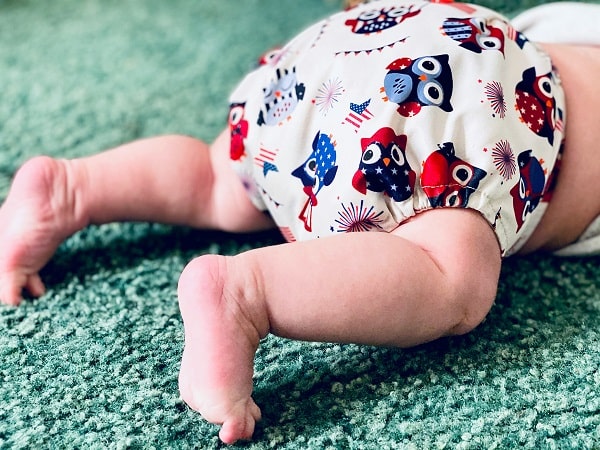As a parent, choosing the right diaper for your baby is a significant decision that affects not only your child’s comfort but also the environment. The decision between cloth diapers and eco-friendly disposables can be overwhelming. While traditional disposable diapers have been the go-to for convenience, they’ve come under scrutiny for their environmental impact. The average baby goes through approximately 6,000 diapers before they’re potty-trained, which adds up to a lot of waste in landfills. But with sustainable options like cloth diapering and eco-friendly disposables, there are ways to make diapering gentler on the planet.
In this guide, we’ll dive into the pros and cons of both cloth diapers and eco-friendly disposable options so you can choose the best approach for your baby and your lifestyle. Whether you’re aiming for a zero-waste household or just looking to make more environmentally conscious choices, this article will help you navigate the world of sustainable diapering.
Understanding the Impact of Your Diaper Choice
Choosing the right type of diaper for your child isn’t just a personal decision; it’s also an environmental one. Each year, millions of disposable diapers end up in landfills where they take hundreds of years to decompose. By considering cloth diapers, you’re not only opting for a sustainable choice but also influencing the market demand towards greener products.
The Environmental Benefits of Cloth Diapers
Cloth diapers offer a substantial reduction in environmental waste. Unlike disposables, which you must throw away after a single use, cloth diapers can be washed and reused many times. This reduces the need for frequent manufacturing and decreases the volume of waste in landfills. Moreover, cloth diapers are made from natural materials, which are less resource-intensive to produce compared to the plastics and chemicals used in conventional disposables.
Cloth Diapering: Pros and Cons
Cloth diapers are reusable, washable diapers made from natural fibers or synthetic materials. They come in various styles, from traditional pre-folds to more modern all-in-one designs that resemble disposables but can be washed and reused multiple times.
Pros of Cloth Diapering
- Reduced Environmental Impact: Significantly lower waste and carbon footprint compared to disposables.
- Cost Savings: Long-term savings and potential to reuse for multiple children.
- Healthier for Baby’s Skin: Fewer chemicals, breathable, and softer materials.
Cons of Cloth Diapering
- Time and Effort: Requires frequent washing and effective storage systems for soiled diapers.
- Upfront Cost: Higher initial investment than disposables.
- Convenience Factors: Less practical for traveling or on-the-go use.
Eco-Friendly Disposable Diapers: Pros and Cons
Eco-friendly disposable diapers are made from sustainable, biodegradable, or compostable materials, designed to have a lower environmental impact than traditional disposables.
Pros of Eco-Friendly Disposable Diapers
- Convenience: Similar to regular disposables but without the extensive environmental damage.
- Lower Environmental Impact: Made from biodegradable materials and fewer chemicals.
- Better for Sensitive Skin: Gentler on the skin due to natural materials and fewer chemicals.
Cons of Eco-Friendly Disposable Diapers
- Higher Cost: More expensive per diaper than both cloth and traditional disposables.
- Limited Biodegradability: Requires specific conditions to break down, which may not be available in all areas.
- Still Contributes to Waste: Although reduced, still produces single-use waste.
Making the Choice: Cloth Diapers or Eco-Friendly Disposables?
Deciding between cloth diapers and eco-friendly disposables involves considering several factors like lifestyle, budget, and environmental impact. Cloth diapers require an initial investment and more effort in terms of laundry but offer significant long-term savings and environmental benefits. Eco-friendly disposables, while more convenient, still contribute to landfill waste but are a better option than traditional disposables due to their biodegradable materials.
Why Choose Cloth Diapers?
If minimizing your environmental footprint is a priority, cloth diapers are the way to go. They not only offer a reusable solution but also cut down on the chemicals and plastics that come into contact with your baby’s skin. For families willing to invest a bit more time into their diapering routine, cloth diapers provide a highly effective and sustainable choice.
When to Consider Eco-Friendly Disposables
There are times when even the most dedicated cloth diapering parents might need a backup option. Eco-friendly disposables are ideal for situations where laundry facilities are unavailable, such as during travel or emergencies. They offer the convenience of disposables without the heavy environmental toll of traditional plastic-based products.
FAQs: Sustainable Diapering
How many cloth diapers do I need?
It depends on how often you plan to wash them. Most parents start with 20-30 cloth diapers for full-time use, which allows for washing every 2-3 days.
Can eco-friendly disposable diapers be composted at home?
While some eco-friendly diapers claim to be compostable, most require industrial composting facilities. Always check the brand’s guidelines to see if they can be composted at home.
What’s the best way to store dirty cloth diapers before washing?
Use a diaper pail with a washable liner or a large wet bag to store dirty diapers. Make sure to wash them every 2-3 days to prevent odors and staining.
Wrapping Up: Choosing the Sustainable Diapering Path
When it comes to sustainable diapering, there’s no one-size-fits-all solution. Both cloth diapers and eco-friendly disposables have their pros and cons, and the right choice depends on your family’s needs, lifestyle, and environmental goals. Whether you decide to go fully cloth, stick with eco-friendly disposables, or mix the two, the most important thing is making the effort to reduce your impact.
What’s your diapering journey been like? Have you tried cloth or eco-friendly disposable diapers? Let us know in the comments and share your tips for sustainable diapering!

